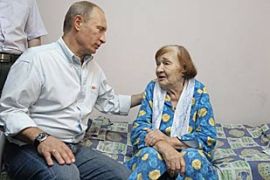Dozens die as Russian fires spread
State of emergency in many areas as country’s hottest summer on record causes devastation.

Putin appeal
Weeping women greeted Vladimir Putin, the prime minister, as he visited Verkhnyaya Vereya, a village where all 341 homes were burned to the ground and five residents were killed in the blaze.
The village, one of three hamlets destroyed around Nizhny Novgorod, Russia’s fifth-largest city some 475km east of Moscow, looked like a ghost town coated in gray ash.
“Before winter, each house will be restored,” Putin told the distressed crowd. “I promise the village will be rebuilt.”
One sobbing woman thanked him for his “serious talk” and promises of $6,500 in compensation for each villager as Putin kissed her on the cheek.
In all nearly 2.5 million acres (one million hectares) of land have been consumed by wildfires so far this season.
During his tour, Putin urged local officials to step up operations to defeat the fires and asked Dmitry Medvedev, the president, to send troops in to help.
Television showed Putin in a birch forest calling Medvedev on a mobile phone, then switched to footage of the president taking the call and promising to mobilise the army.
Fires have all but encircled Voronezh, a city of 850,000 people located 475km south of Moscow.
Streets were filled with smog on Friday and a giant wall of rising black smoke could be seen on the horizon.
Global warming
Weather experts say as global warming intensifies, Russians unaccustomed to such sweltering heat should brace for more summers like this.
Temperatures hit 37.8 Celsius in Moscow on Thursday, setting a new record, and July was the hottest month ever recorded in Russia.
“In 130 years of daily weather monitoring in Moscow, there has never been such a hot summer,” said Alexei Lyakhov, director of Moscow’s Meteorological Service.
“This is not normal weather, this has never happened.”
The agriculture ministry said about 9.6 million hectares (24 million acres) of grain crops, an area the size of Kentucky, have been destroyed by the heat wave.
More than 900 patients had to be hurriedly transferred out of a Voronezh hospital on Thursday and nearly 2,000 children were evacuated from 12 summer camps in the path of the flames.
Firefighters poured water on the forests from the air to try to contain the inferno.
Forest fires reached Moscow’s western fringe but were extinguished late on Thursday.
Cooler air from the west brought some respite from the heat on Friday and cleared a potentially dangerous smog cloud caused by peat bogs burning east and south of the capital.
Lyakhov said the temperatures for July are eight degrees Celsius higher than normal, adding that the heat appeared to be evidence of global warming.
“For the last few years the winters have been warm, so now perhaps a period of hot summers is starting,” he said.